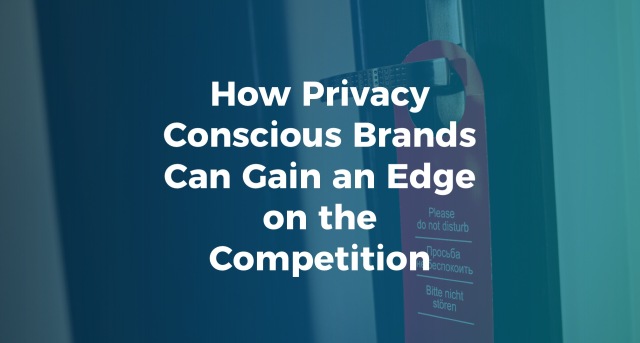We’ve all had ads appear online that are eerily relevant to our last conversation or something we recently searched for — like when you talk to your friends about being single at 35, only to have dating app ads pop up all over your browser the next day.
Brands are latching onto these retargeting tactics because they provide a great opportunity to give users exactly what they’re looking for. If users show interest in so much as a pair of socks online, those socks will inundate their Facebook feed for weeks — never mind a big-ticket item like a couch or a car. This tactic can be convenient for brands, but the Big Brother-esque feelings these ads produce can be unsettling for those targeted.
As consumers become warier of digital ads that infringe on their privacy, brands must think of ways to relate to their customers without appearing to intrude on them. Is there an opportunity for brands to get ahead by establishing themselves as privacy-conscious, at a time when targeted — even invasive — ads are the norm?
Is Privacy Consciousness the New Corporate Social Responsibility?
For today’s consumer, quite possibly.
Many brands already motivate consumers by highlighting their sustainability and other corporate social responsibility initiatives. It’s likely that they can find the same success by cultivating a reputation as privacy-conscious. Consumers who are tired of being hypertargeted by brands may choose to show their support for companies that are more respectful of their privacy online.
Meanwhile, some very major brands are going in the opposite direction. Brands are increasingly using advanced methods, such as facial recognition technology and demographic tracking, to connect consumers’ online and offline purchasing behavior.
Take Walmart, for example, which recently filed a patent for a facial recognition system that can use checkout kiosks to determine a customer’s level of happiness. Or Amazon, which tracks customer behaviors — everything from a customer’s past purchases to what they pick up off a shelf — at Amazon Go stores. In a sense, both companies are testing customers’ willingness to trade privacy for convenience in a real-world situation.
How to Change the Privacy Narrative and Public Perception
Brands navigate these privacy issues in their digital advertising initiatives in many ways. Here are ways to change customer perceptions surrounding privacy.
Give control back to the user.
Making it easy for people to opt-out or accept the use of their data and privacy ensures that users only see ads that they find useful, as opposed to ads that are inappropriately targeted at them. When you do track your customers’ data, don’t be creepy about it. In other words, don’t lead with, “We just saw you log in and do A, B, and C…”
On your company’s website, you could allow users to opt in to being targeted (rather than opting out). When certain brands ask users to confirm the use of cookies, it means a law is in place that requires brands to get consent from visitors before any information is collected.
Even if you’re not subject to such laws, it might be a wise decision to offer this option to users, if only to give them peace of mind when it comes to feeling secure on your site.
Be cognizant of using highly personal data.
Consumers targeted when browsing for household items or clothing might not feel as if their privacy has been violated. However, if the targeted ads involve medical details or a life event (for instance, engagement rings or baby items), people start to get sensitive.
Using marketing analytics based on one of its customer’s purchasing habits, for example, Target was able to determine that a teenage girl was pregnant, which triggered the retailer to mail coupons to her house for baby products. But her parents weren’t aware of her pregnancy, and the tactic was seen as a breach of privacy, rather than a smart move to gain business from mothers-to-be.
Treat your customers’ personal data as discreetly as you would your company data. How you collect it and what you do with it depends on which product you’re marketing, and it is up to you to install safeguards that ensure it’s being used properly.
Build trust by building relationships.
To appeal to more consumers, you need to make sure your marketing feels welcome and invited. One way to do this is to appeal to consumers on a personal level.
San Francisco clothing upstart brand Everlane understands this. The brand differentiates itself through its policy of radical transparency and community-forward marketing tactics. Not only is it truthful about the production methods, but it also shares this information in personable and authentic ways: through Instagram Stories, Snapchat, and even tours of its factories.
Through this candid approach, Everlane helps customers get to know the brand so that, when it does market to its customers, the ads feel more like messages from a trusted source than intrusive interruptions from a brand. By building relationships with consumers, Everlane has amassed an impressive following and gained extensive free media through social posts and word-of-mouth advertising.
Shout it from the rooftops.
Branding your business as being privacy conscious can’t hurt in a digital world that is rife with intrusiveness. When you do use ad retargeting to reach users, consider being upfront about your commitment to privacy. Instead of driving sales through a disingenuous call to action, perhaps saying, “We’re privacy conscious, so we promise we won’t target you if you click here,” would make your brand more appealing.
Making an effort to be conscious of people’s privacy in your digital advertising strategy is a smart move. Even though customers aren’t always taking steps to protect their privacy online, it remains a major concern. Letting consumers know that you care about their online privacy is a golden opportunity to connect with them on a deeper level and build the kind of trust that will bring them back for more.
About Matt Smith
Matt Smith is the founder of Later, the No. 1 Instagram marketing platform to visually plan and schedule Instagram posts. Prior to Later, Matt founded several startups, including Thinkific, an online course platform helping thousands of people build businesses online.
![]()
from Blogs http://ift.tt/2G9I4jC


No comments:
Post a Comment